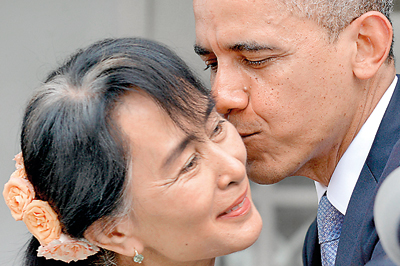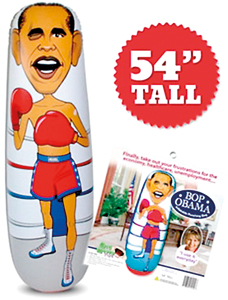Sunday Times 2
In Myanmar, Obama saw a nation that shaped his grandfather
WASHINGTON – When President Obama visited Yangon on Monday, he was the first sitting American president to visit the country now known as Myanmar. But he was not the first Obama to visit.
“His roots go through Burma,” said Timothy Parsons, an African history professor at Washington University in St. Louis who wrote a book on the colonial East African military. “It is kind of an odd intersection of his life. It’s like the three corners of the triangle come together – America, East Africa and Southeast Asia.”
Thant Myint-U, a Burmese historian and author, said the president may be able to connect with the country in a way another American leader might not.

Obama kisses Myanmar opposition leader Aung San Suu Kyi after speaking to the press following their meeting at her residence in Yangon on November 19. AFP
“The Burma that the president will see will look amazingly similar to the Burma his grandfather saw in the 1940s,” he said. “But what will not be readily visible are the effects of more than six decades of armed conflict, half a century of dictatorship and self-imposed isolation and 20 years of Western sanctions. It’s a country that lacks the most basic institutions.”
The president’s grandfather, who went by Onyango, played a key role in the younger Mr. Obama’s life even though the two never met. He was a central figure in Mr. Obama’s voyage of self-discovery captured in his autobiography, “Dreams from My Father,” which describes the journey of a mixed-race American to Kenya to explore his roots.
Onyango Obama, believed to be born in 1895, was a member of the Luo tribe who worked for years as a servant for white colonialists in Kenya. His son, the first Barack Hussein Obama, was the future president’s father. Onyango Obama was described as a strong-willed and stern man, abusive of the multiple women he would marry over his lifetime.
He took the Arabic name Hussein when he converted to Islam and married a Muslim woman while living on the island of Zanzibar. When World War II broke out, according to the stories that the younger Mr. Obama was told, Onyango Obama travelled to Burma, Ceylon and Arabia as a cook for a British captain in the King’s African Rifles. The unit played a crucial role in the Burma campaign, according to scholars.
Some 75,000 Kenyans served in Burma during the war and many of them were transformed by their exposure to the outside world, according to scholars. Many met black soldiers and airmen from the United States, who despite the lingering segregation and discrimination back home, had far more independence and responsibility than the Kenyans serving the British.
Onyango Obama returned home with a picture of a Burmese woman he claimed to have married – “She looked like my mother,” the future president wrote – and a brewing disillusionment with colonial rule. Having been part of the fight for freedom against the Japanese empire, he and other Burma veterans began to rise up for freedom for themselves in Africa. “Like many others, President Obama’s grandfather emerged from wartime service a wiser and more politicised person,” said David M. Anderson, a professor of African politics at the University of Oxford.
Like many of them, Onyango Obama was sympathetic to the Kenyan African Union movement that would later evolve into the more radical Mau Mau rebellion.
When his grandson visited Kenya in the 1980s, he was told that the elder Mr. Obama was arrested by the British in 1949. His fifth wife, relating stories that she was told from before their marriage, later told journalists that Onyango Obama was tortured while in custody, his testicles squeezed with pincers and his nails and buttocks pierced with a sharp pin. The Mau Mau rebellion broke out in 1952 and was brutally suppressed by the British, resulting in the deaths of at least 12,000 Africans. Onyango Obama reportedly died in 1979.
The stories of abuse fuelled speculation when President Obama took office in 2009 that he resented Britain and would not value the “special relationship” between Washington and London as his predecessors had. Some in the British news media even interpreted the return of a Winston Churchill bust that sat in the Oval Office under President George W. Bush as a reaction to what happened to Mr. Obama’s grandfather, never mind that another Churchill bust remains in the White House.
But a new book this year suggested that Onyango Obama was never actually arrested, much less tortured. In “Barack Obama: The Story,” his biography of the president, the Washington Post journalist David Maraniss reported that five associates of the elder Mr. Obama “said they doubted the story or were certain it did not happen.” One of his daughters said he had once been kidnapped, meaning perhaps that the story had become twisted over the years.
Either way, Burma was a place of awakening for Mr. Obama’s grandfather, a place where larger possibilities first presented themselves. But whatever ambitions he began to harbour then, he could hardly have imagined that seven decades later, his grandson would return to Burma aboard a blue-and-white 747 known as Air Force One.
(Courtesy the New York Times)
Follow @timesonlinelk
comments powered by Disqus


















